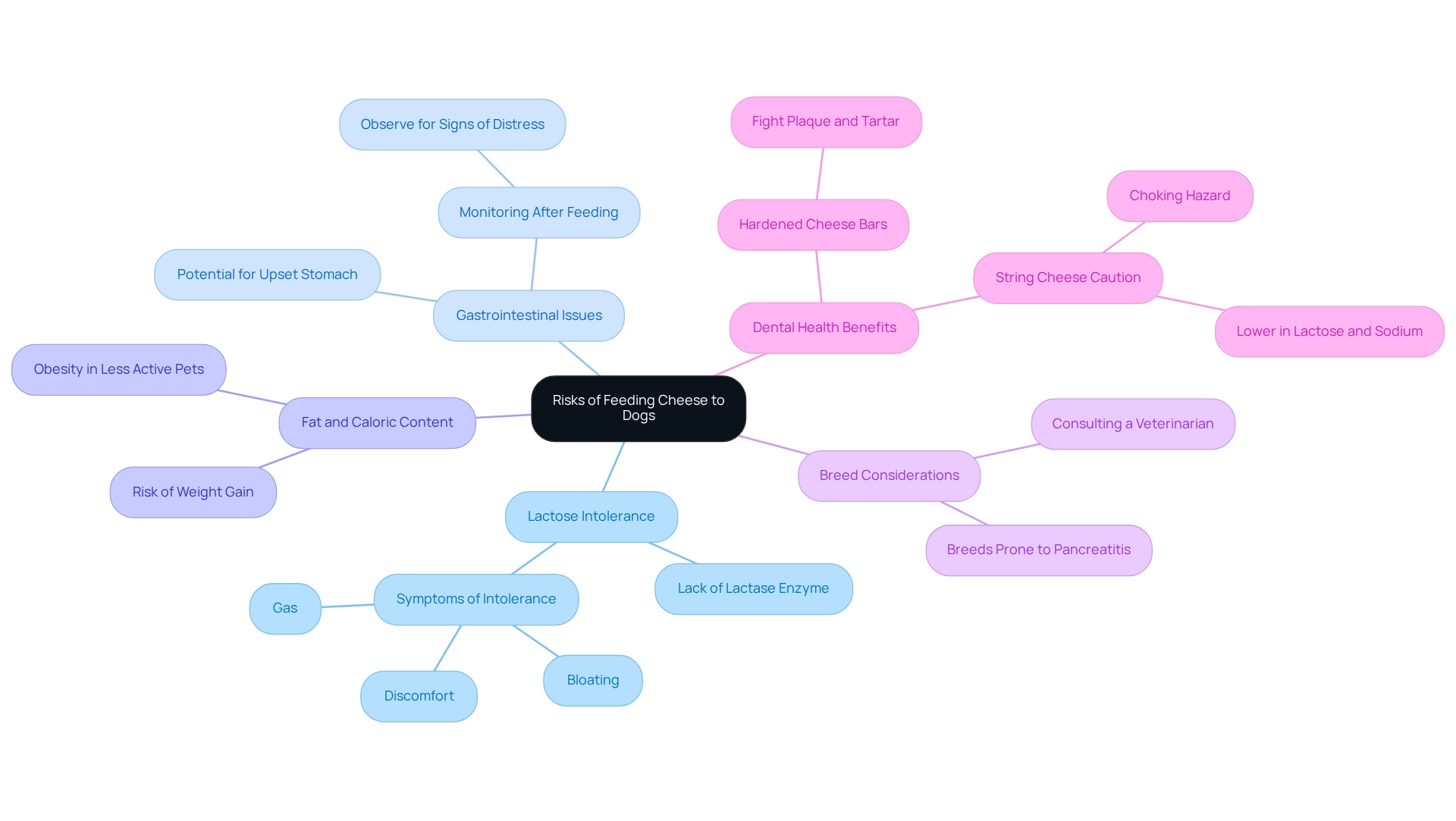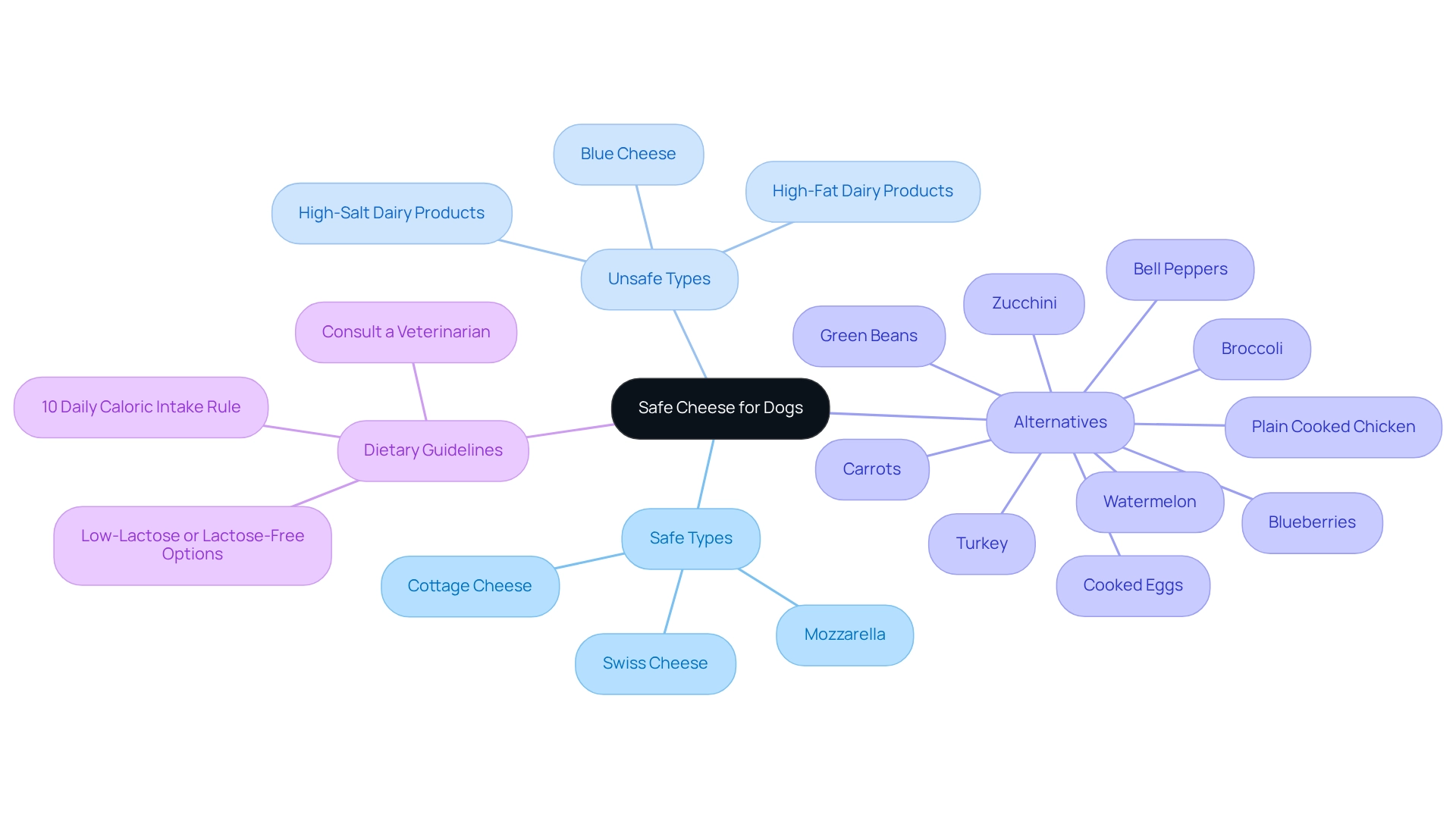Can Dogs Have Cheese? Understanding Its Benefits and Risks
Overview
As loving pet owners, we often seek the best treats for our furry family members. Cheese can indeed be a delightful treat for dogs when offered in moderation. It provides essential protein and nutrients that can benefit their health. However, it’s important to remember that cheese should not become a primary food source due to potential digestive issues and its high fat content.
At Adventure Den, we understand that every dog is unique. Monitoring your dog’s individual reactions to cheese is crucial, especially for those who may be lactose intolerant. We recommend that cheese should only make up a small portion of your dog’s overall diet to ensure their continued well-being.
By keeping these considerations in mind, you can create a nurturing environment for your beloved pet. Always prioritize their health and happiness, and feel free to reach out to us for more personalized advice on your dog’s dietary needs.
Introduction
Cheese holds a cherished spot in the hearts of both dogs and their owners, often regarded as a delightful treat that can enhance training sessions or cleverly disguise the taste of medicine. While this creamy indulgence can provide nutritional benefits, it is essential for pet owners to understand the considerations that accompany it.
From the varying lactose tolerance among dogs to the potential for weight gain from overindulgence, the role of cheese in a canine diet is more nuanced than it may seem. This article explores the nutritional advantages, safe types, and potential risks associated with incorporating cheese into your furry family member’s diet, offering you the insights needed to make informed and caring decisions for your beloved pets.
Understanding Cheese in Your Dog’s Diet
Many of our beloved canines find cheese to be a delightful dairy treat, which leads to the question: can dogs have cheese because of its rich flavor and aroma? While it can be an enjoyable reward during training or a special snack, it’s essential to consider if can dogs have cheese, as it should not become a primary food source for your furry family members. Instead, it should complement a balanced diet that meets all their nutritional needs. The question of can dogs have cheese arises, as cheese contains lactose that varies in digestibility among dogs; some can handle it well while others may face digestive challenges. Therefore, it’s crucial to monitor your dog’s individual reactions when introducing this tasty dairy product.
When considering your dog’s diet, it’s important to ask, can dogs have cheese, as it offers protein and vital nutrients when given in moderation. An ounce of cheese typically contains about 1 gram of carbohydrates, which can help meet your dog’s energy needs without overwhelming their diet. However, due to its high fat and calorie content—especially in varieties like cream cheese—it’s advisable to limit dairy intake, particularly for overweight dogs, as highlighted by Lynn Guthrie’s insights.
Incorporating cheese as an occasional treat leads to the question of can dogs have cheese, as it can provide several benefits, such as enhancing the flavor of medications or serving as a reward during training sessions. However, it’s vital to adhere to nutritional guidelines and ensure that dairy consumption does not exceed 10% of your dog’s daily caloric intake. This aligns with findings from the case study “Understanding Dogs’ Body Condition,” which underscores the importance of maintaining a healthy body condition for overall well-being. Moreover, addressing misconceptions and truths about canine weight can further enlighten pet owners regarding the effects of dairy on their pets’ health. By understanding the role of dairy in your dog’s diet and practicing moderation, you can safely enjoy the benefits of this tasty treat while nurturing your dog’s overall health.
Nutritional Benefits of Cheese for Dogs
Many pet owners wonder, can dogs have cheese as a delightful and nutrient-rich addition to their furry family members’ diets, offering several advantages? It’s an excellent source of protein, essential for muscle development and repair, and is rich in calcium, vital for maintaining strong bones and teeth. Additionally, dairy products provide important vitamins A and B-complex, contributing to overall health. For example, cottage curds are a low-fat, high-protein choice, making them an ideal snack for dogs in need of nutritious treats.
While dairy can certainly enhance a dog’s diet, it’s best to consider if can dogs have cheese as an occasional indulgence rather than a daily staple. Moderation is key; small amounts of dairy products like cheddar, mozzarella, and cottage cheese are typically safe for most dogs, leading to the question of whether can dogs have cheese. For instance, a 90-pound dog should have treats that do not exceed 110 to 135 calories daily, including dairy. As Kathryn, a writer on pet matters, wisely notes, ‘As long as you exercise caution and provide them the appropriate type of dairy in moderation, dairy is acceptable for most canines, so the question is, can dogs have cheese?’
However, it’s important for pet owners to monitor their pets for any adverse reactions after consuming dairy. If any concerns arise, consulting a veterinarian is always a wise choice. Thoughtfully incorporating dairy can not only provide enjoyment but also nutritional value to your dog’s diet.
For those seeking alternatives, consider the insights from the case study “Dog-Safe Alternatives to Cheese,” which highlights healthy human food options such as:
- blueberries
- carrots
- plain cooked chicken
These alternatives offer similar nutrients without the added calories or fat, ensuring your beloved pets remain healthy and happy.
Risks and Considerations When Feeding Cheese to Dogs
While dairy products can be a tempting indulgence for your furry family members, it’s important to consider if dogs can have cheese and be aware of certain risks. Many dogs are lactose intolerant, leading to the important question of can dogs have cheese, since they lack the enzyme needed to digest lactose effectively. This intolerance can lead to gastrointestinal issues, and one common question is whether dogs can have cheese. Symptoms may include bloating, gas, and discomfort after consuming dairy, which raises the question: can dogs have cheese? Additionally, since dairy can be rich in fat and calories, overindulgence can contribute to weight gain and obesity, particularly in less active pets. Certain breeds, especially those predisposed to pancreatitis, should avoid high-fat dairy products entirely, which leads many to question if dogs can have cheese, although hardened dairy bars can help combat plaque and tartar in dogs, offering a dental health benefit. For instance, while string cheese is lower in lactose and sodium, its texture can pose a choking risk, making it important to consider if dogs can have cheese safely as a snack. It’s recommended to gradually incorporate dairy into your dog’s meals, as you may wonder if dogs can have cheese, and closely monitor for any signs of gastrointestinal distress after the first feeding. Before introducing dairy into your dog’s diet, it’s highly advisable to consult with a veterinarian to ensure it aligns with their health needs and dietary restrictions, especially regarding whether dogs can have cheese. By being mindful of these considerations, you can safely enjoy the occasional dairy treat with your beloved companion.

Safe Types of Cheese for Dogs
When it comes to choosing dairy products for your furry family members, it’s essential to recognize that not all options are suitable, especially when considering the question, can dogs have cheese? Safe choices include low-fat varieties like mozzarella, cottage cheese, and Swiss cheese, which generally have lower lactose levels. This reduces the risk of digestive upset, allowing your pet to enjoy their treats without discomfort. Cottage curds, in particular, stand out as an excellent choice due to their reduced lactose content, making them a safer alternative for canines and less likely to cause intestinal issues.
Creamy spreads can be offered in moderation, but it’s important to steer clear of high-fat, high-salt dairy products and those containing harmful additives, such as blue cheese, which can pose toxicity risks for dogs. Always opt for plain, unseasoned dairy products to minimize health concerns and ensure a safe treat for your beloved companion. For dogs with lactose intolerance, low-lactose or lactose-free dairy options are recommended to help maintain their digestive health, so it’s crucial to consider if can dogs have cheese and seek advice from your veterinarian to ensure it meets their nutritional needs. Remember, any food outside of your dog’s regular diet, including dairy products, should never exceed ten percent (10%) of their daily caloric intake.
If you’re looking for alternatives to cheese, consider offering your dog nutritious options like:
- blueberries
- carrots
- broccoli
- plain cooked chicken
- cooked eggs
- turkey
- green beans
- zucchini
- watermelon
- bell peppers
These alternatives provide similar nutrients without the added calories or fat, ensuring your pet remains healthy and happy.

Conclusion
Incorporating cheese into your furry family member’s diet can be both enjoyable and beneficial, but it’s important to approach this delightful treat with moderation and mindfulness. Cheese can enhance training sessions and help mask medications, yet it should never replace a balanced diet. Understanding your dog’s lactose tolerance and nutritional needs is essential, as some dogs may experience digestive issues while others thrive on the occasional cheesy indulgence.
The nutritional benefits of cheese are significant, offering protein, calcium, and essential vitamins. However, it’s crucial to be cautious about the type and amount of cheese you provide. Low-fat options like mozzarella and cottage cheese are generally safer choices, while high-fat varieties should be limited, especially for dogs prone to weight gain or pancreatitis. Monitoring for any adverse reactions after introducing cheese is vital to ensure a positive experience for your pet.
Ultimately, cheese can be a rewarding addition to your dog’s diet when used wisely. By adhering to guidelines that recommend cheese to comprise no more than 10% of daily caloric intake and opting for safe varieties, you can enjoy the benefits of this popular treat without compromising your dog’s health. With careful consideration and a focus on moderation, cheese can indeed be a delightful indulgence for your beloved companion.
Frequently Asked Questions
Can dogs have cheese?
Yes, dogs can have cheese as a treat, but it should not become a primary food source. It should complement a balanced diet that meets all their nutritional needs.
Why is it important to monitor a dog’s reaction to cheese?
Cheese contains lactose, which varies in digestibility among dogs. Some dogs can handle it well, while others may face digestive challenges, so it’s crucial to observe individual reactions when introducing cheese.
What nutritional benefits does cheese provide for dogs?
Cheese offers protein and vital nutrients when given in moderation. An ounce of cheese typically contains about 1 gram of carbohydrates, which can help meet a dog’s energy needs.
Are there any concerns associated with feeding dogs cheese?
Yes, cheese has high fat and calorie content, especially in varieties like cream cheese. It’s advisable to limit dairy intake, particularly for overweight dogs.
How much of a dog’s daily caloric intake should come from dairy?
Dairy consumption should not exceed 10% of a dog’s daily caloric intake to maintain a healthy body condition.
What are some benefits of using cheese as a treat for dogs?
Cheese can enhance the flavor of medications and serve as a reward during training sessions, making it a useful occasional treat.
How can pet owners ensure cheese is safely included in their dog’s diet?
By understanding the role of dairy in their dog’s diet and practicing moderation, pet owners can safely enjoy the benefits of cheese while nurturing their dog’s overall health.







